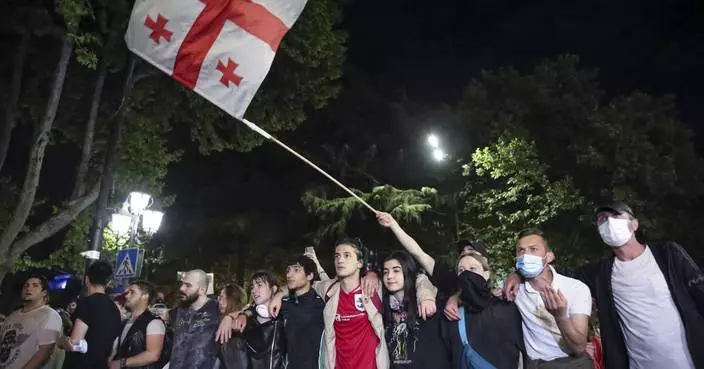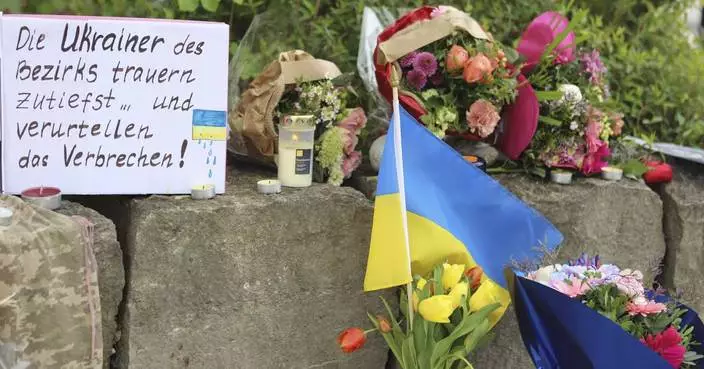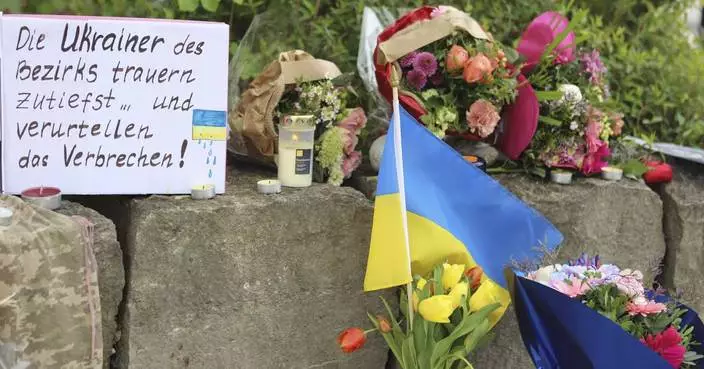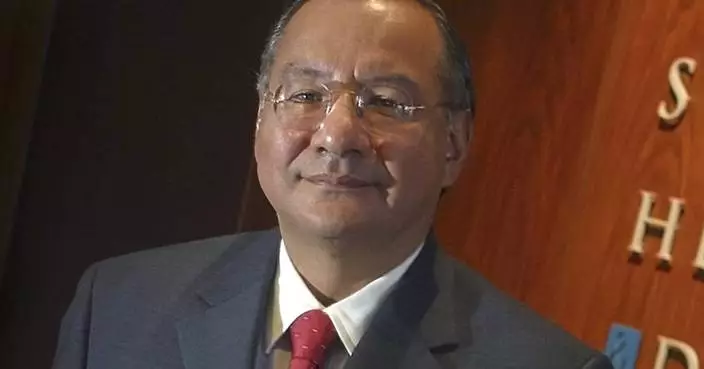As British authorities investigate the poisoning of a former Russian spy and his daughter in England, there is much mystery about how exactly the brazen attack was carried out. Here are some of the unanswered questions that British officials are chasing:
WHERE DID THE NERVE AGENT ORIGINATE?
British Prime Minister Theresa May has declared that former Russian military intelligence officer Sergei Skripal and his daughter Yulia were poisoned March 4 in Salisbury with Novichok, a class of military-grade nerve agents developed by the Soviet Union at the end of the Cold War. They are both in critical condition.
Hamish de Bretton-Gordon, an ex-commander of the British Army's chemical, biological, radiation and nuclear regiment, said Novichok was only ever manufactured at one site, a military laboratory at Shikhany in central Russia.
De Bretton-Gordon said there were rumors of a Novichok test in Uzbekistan in the 1980s but that any of the remaining nerve agent from that experiment would have lost its toxicity — and that the agent used to poison the Skripals was extremely toxic. He said it was "very unlikely" the Novichok used in Salisbury could have been lost or stolen in the years after the Soviet Union collapsed in 1991.
Russia's envoy at the international chemical weapons watchdog said Britain and the U.S. both had access to Novichok and that the nerve agent used to attack the Skripals could have come from either of their stockpiles.
De Bretton-Gordon dismissed that claim as "complete hogwash."
According to the Organization for the Prohibition of Chemical Weapons, there is no record of Novichok nerve agents having been declared by any nation that signed the Chemical Weapons convention.
___
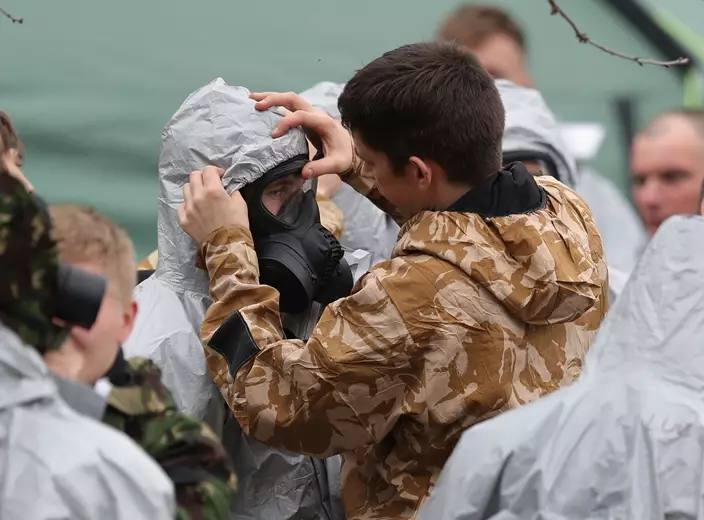
Military personnel are prepared before working to remove cars from a car park in Salisbury, England, as police and members of the armed forces probe the suspected nerve agent attack on Russian double agent spy Sergei Skripal, Sunday March 11, 2018. British government security ministers held an emergency meeting Saturday to discuss the poisoning of former spy Skripal and his daughter Yulia, as investigations continue. (Andrew Matthews/PA via AP)
HOW DID NOVICHOK ARRIVE IN BRITAIN?
It's unclear. Some British media, citing unnamed police sources, are reporting that Yulia Skripal unknowingly brought the Novichok nerve agent to Salisbury in her suitcase on a plane trip from Moscow, arriving in Britain the day before the attack.
Some scientists say it's feasible that the nerve agent could be made stable enough to travel and that various compounds could have been added to Novichok to make it a clear, colorless liquid resembling water, perfume or alcohol. The ingredients to make Novichok are relatively cheap and accessible, but mixing them together is extremely dangerous, which suggests the nerve agent was brought to the U.K. as a finished product.
"The moment you mix this stuff up, it presents a high risk to you — and if you were to spill it, you'd be in terrible danger," said Andrea Sella, a professor of inorganic chemistry at University College London.
He said nerve agents like Novichok are usually highly unstable and degrade quickly in the presence of moisture, but that if the agent was sealed in a tight container "it ought to be able to hang around."
De Bretton-Gordon said it was possible that the Novichok arrived in Salisbury in Yulia Skripal's suitcase, but said much could go wrong in such a scenario.
"I think there must be somebody behind it who has delivered it," he said.
___
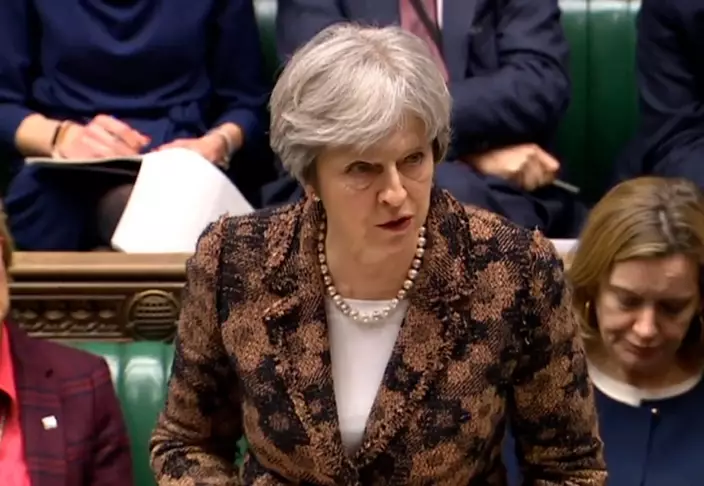
Britain's Prime Minister Theresa May speaks in the House of Commons in London, Monday, March 12, 2018. British Prime Minister Theresa May says her government has concluded it is "highly likely" Russia is responsible for the poisoning of an ex-spy and his daughter. May told British lawmakers on Monday that Sergei Skripal and his daughter, Yulia, were exposed to a nerve agent known as Novichok (Novice), a weapon developed in the Soviet Union in the end of the Cold War. (PA via AP)
HOW WERE THE SKRIPALS EXPOSED TO THE NERVE AGENT?
It's thought the Skripals were exposed to Novichok at the elder Skripal's home in Salisbury. But officials are struggling to explain why there appears to have been a significant delay between when they were exposed to the deadly agent and when they got sick.
Yulia Skripal arrived in the U.K. on March 3 but it was not until the following day — after she and her father had eaten lunch and stopped at a pub — that they were found slumped over unconscious on a public bench. A police officer who then visited the Skripal residence was also later hospitalized for chemical poisoning. As of Friday he was still in serious condition.
"The fact that both the father and daughter came down with very similar symptoms at a similar time suggests that the contact with Novichok was fairly close for both of them," said Alastair Hay, a professor emeritus of environmental toxicology at the University of Leeds.
Sella said it seemed unusual that neither of the Skripals appeared to have noticed their exposure to Novichok since they did not seek medical attention.
"It seems like (the Novichok) was disguised incredibly cunningly, because if you suddenly realized there was this horrendous substance in something that you thought was innocuous, you would immediately raise the alarm," he said. "But to all appearances, they had no real concerns: they went to lunch and they went to a pub."
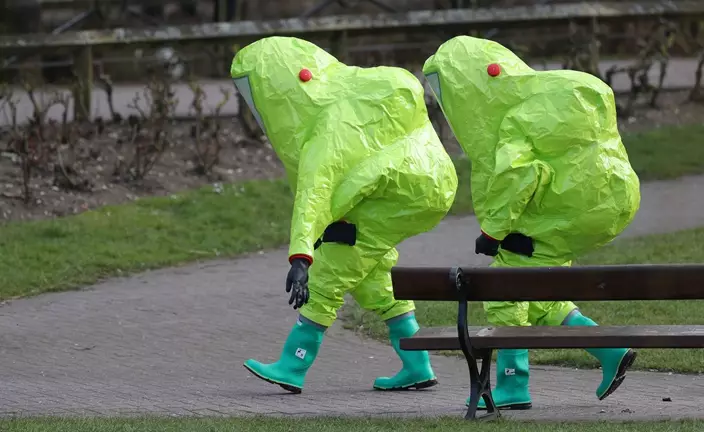
Personnel in hazmat suits walk away after securing the covering on a bench in the Maltings shopping centre in Salisbury, England on Thursday March 8, 2018, where former Russian double agent Sergei Skripal and his daughter Yulia were found critically ill by exposure to a nerve agent on Sunday. (Andrew Matthews/PA via AP)
TBILISI, Georgia (AP) — Georgia has been engulfed by huge protests triggered by a proposed law that critics see as a threat to media freedom and the country’s aspirations to join the European Union.
Here is a look at the bill and the protests it has ignited:
The bill would require media and nongovernmental organizations and other nonprofits to register as “pursuing the interests of a foreign power” if they receive more than 20% of funding from abroad.
The legislature approved a second reading of the bill Wednesday, and the third and final reading is expected later this month.
The proposed legislation is nearly identical to the one that the governing Georgian Dream party was pressured to withdraw last year after street protests.
The governing party says the bill is necessary to stem what it deems as harmful foreign influence over the country’s political scene and to prevent unidentified foreign actors from trying to destabilize the country’s political scene.
The opposition denounces the bill as “the Russian law” because Moscow uses similar legislation to stigmatize independent news media and organizations critical of the Kremlin. Opponents of the bill say the fact that it is now before parliament is a sign of Moscow’s purported influence over Georgia. They fear it will become an impediment to the country’s long-sought prospects of joining the European Union.
Georgian President Salome Zourabichvili, who is increasingly at odds with the governing party, has vowed to veto the law, but Georgian Dream has a majority sufficient to override a presidential veto.
Russia-Georgia relations have been strained and turbulent since the 1991 collapse of the Soviet Union.
In August 2008, Russia fought a brief war with Georgia, which had made a botched attempt to regain control over the breakaway province of South Ossetia. Moscow then recognized South Ossetia and another separatist province, Abkhazia, as independent states and beefed up its military presence there. Most of the world considers both breakaway regions to be parts of Georgia, a former Soviet republic.
Tbilisi has ruptured diplomatic ties with Moscow, and the separatist regions’ status remains a key irritant, even as Russia-Georgia relations have improved in recent years.
The opposition United National Movement accuses Georgian Dream, which was founded by Bidzina Ivanishvili, a billionaire who made his fortune in Russia, of serving Moscow’s interests — an accusation the governing party vehemently denies.
For several successive days, thousands of demonstrators besieged the parliament building in a bid to block the bill’s passage and scuffled with police.
Police used tear gas and water cannons to disperse the crowds. Over 60 protesters have been arrested and several people have been injured. Levan Khabeishvili, chairman of the United National Movement, was among those injured.
On Thursday, parliament canceled its scheduled session, saying the move was because of damage to the building during Wednesday’s protests.
EU foreign policy chief Josep Borrell has described the parliament’s move as “a very concerning development” and warned that “final adoption of this legislation would negatively impact Georgia’s progress on its EU path.”
“This law is not in line with EU core norms and values,” Borrell said in a statement last month. “The proposed legislation would limit the capacity of civil society and media organizations to operate freely, could limit freedom of expression and unfairly stigmatize organizations that deliver benefits to the citizens of Georgia.”

A demonstrator gestures standing between opposition protesters who gather to protest against "the Russian law" in Tbilisi, Georgia, on Tuesday, April 30, 2024. Clashes erupted between police and opposition demonstrators protesting a new bill intended to track foreign influence that the opposition denounced as Russia-inspired. (AP Photo/Zurab Tsertsvadze)

Riot police use a water cannon during an opposition protest against "the Russian law" near the Parliament building in Tbilisi, Georgia, Tuesday night, April 30, 2024. Clashes erupted between police and opposition demonstrators protesting a new bill intended to track foreign influence that the opposition denounced as Russia-inspired. (AP Photo/Zurab Tsertsvadze)

EDS NOTE: OBSCENITY - A demonstrator gestures trying as riot police use a water cannon during an opposition protest against "the Russian law" near the Parliament building in Tbilisi, Georgia, Tuesday night, April 30, 2024. Clashes erupted between police and opposition demonstrators protesting a new bill intended to track foreign influence that the opposition denounced as Russia-inspired. (AP Photo/Zurab Tsertsvadze)

Police use water cannons and tear gas against demonstrators during an opposition protest against "the Russian law" near the Parliament building in Tbilisi, Georgia, on Wednesday, May 1, 2024. Protesters denounce the bill as "the Russian law" because Moscow uses similar legislation to stigmatize independent news media and organizations critical of the Kremlin. (AP Photo/Zurab Tsertsvadze)

Police face demonstrators during an opposition protest against "the Russian law" near the Parliament building in Tbilisi, Georgia, on Wednesday, May 1, 2024. Protesters denounce the bill as "the Russian law" because Moscow uses similar legislation to stigmatize independent news media and organizations critical of the Kremlin. (AP Photo/Zurab Tsertsvadze)

A demonstrator gestures while arguing with the police during an opposition protest against "the Russian law" near the Parliament building in Tbilisi, Georgia, on Wednesday, May 1, 2024. Protesters denounce the bill as "the Russian law" because Moscow uses similar legislation to stigmatize independent news media and organizations critical of the Kremlin. (AP Photo/Zurab Tsertsvadze)

Demonstrators wave Georgian national flag during an opposition protest against "the Russian law" near the Parliament building in Tbilisi, Georgia, on Wednesday, May 1, 2024. Protesters denounce the bill as "the Russian law" because Moscow uses similar legislation to stigmatize independent news media and organizations critical of the Kremlin. (AP Photo/Zurab Tsertsvadze)

A woman shows a heart standing in front of riot police during an opposition protest against "the Russian law" near the Parliament building in Tbilisi, Georgia, on Wednesday, May 1, 2024. Clashes erupted between police and opposition demonstrators protesting a new bill intended to track foreign influence that the opposition denounced as Russia-inspired. (AP Photo/Zurab Tsertsvadze)

Demonstrators scuffle with riot police during an opposition protest against "the Russian law" near the Parliament building in Tbilisi, Georgia, on Wednesday, May 1, 2024. Clashes erupted between police and opposition demonstrators protesting a new bill intended to track foreign influence that the opposition denounced as Russia-inspired. (AP Photo/Zurab Tsertsvadze)

A couple embrace during an opposition protest against "the Russian law" near the Parliament building in Tbilisi, Georgia, on Wednesday, May 1, 2024. Clashes erupted between police and opposition demonstrators protesting a new bill intended to track foreign influence that the opposition denounced as Russia-inspired. (AP Photo/Zurab Tsertsvadze)

Demonstrators sit in front of police line during an opposition protest against "the Russian law" near the Parliament building in Tbilisi, Georgia, on Tuesday, April 30, 2024. Clashes erupted between police and opposition demonstrators protesting a new bill intended to track foreign influence that the opposition denounced as Russia-inspired. (AP Photo/Zurab Tsertsvadze)

Riot police use a water cannon during an opposition protest against "the Russian law" near the Parliament building in Tbilisi, Georgia, on Wednesday, May 1, 2024. Clashes erupted between police and opposition demonstrators protesting a new bill intended to track foreign influence that the opposition denounced as Russia-inspired. (AP Photo/Zurab Tsertsvadze)


















